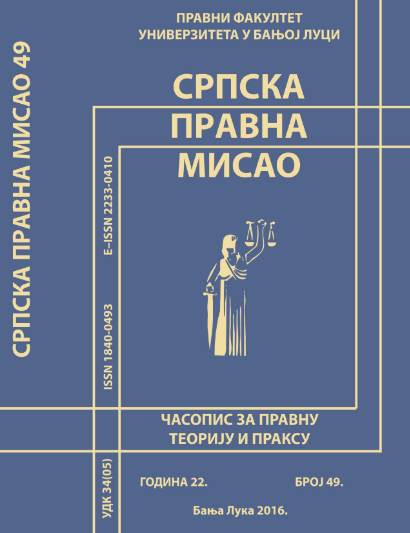
We kindly inform you that, as long as the subject affiliation of our 300.000+ articles is in progress, you might get unsufficient or no results on your third level or second level search. In this case, please broaden your search criteria.


The paper analyses the establishment and organization of a new judicial body for patent litigations in Europe – Unified Patent Court (UPC). After introductory notes with regard to attempts to introduce unitary patent protection system in the European Union, the first part of the article respresnts an overview to the history of establishment of the unified patent litigation system in Europe. The second part analyses the legal bases of the Unified Patent Court. The third part of the article is dedicated to the organization of the Unified Patent Court. The special attention is devoted to appointment of UPC judges, UPC structure and languages of the proceedings before the Unified Patent Court.
More...
The franchising agreement originated at the end of the nineteenth century in the United States and in European countries it use was noted only in mid-twentieth century. By applying it through their business, companies have recognized the possibility of making a profit with far less risk in relation to new business ventures that imply entering into a new, undeveloped and both to a market (and the users) unknown work that has to go through all the stages of acceptance. The franchising agreement is extremely complex agreement with elements of other classic and recent contract, which is often mistakenly both equated and replased with them. The modern legal instruments, whith whom franchising business legaly harmonize, represent the origination of the common law legal system. The franchising agreement formed by written agreement of the parties on the elements of economic cooperation covered by the contract in question. Uniformly concluded contracts provide the same legal position of all franchisees to each other and in relation with the franchiser, thereby preventing disputes among the participants on the occasion of the unilateral privileges of a franchisee. The necessity of the written form of franchising is generally accepted in legal literature, although there is no relevant legislation. The aim of scienticic work is to present the essential elements and the structure of franchise agreements, with particular reference to the specifics of the Anglo-Saxon legal technique that is reflected in the detailed regulation of all potentially predictable situations. The paper deals with the contractual clauses as the main form of presentation of contractual content, with special reference to the clauses governing the specific contractual obligations to make this agreement a contract sui generis.
More...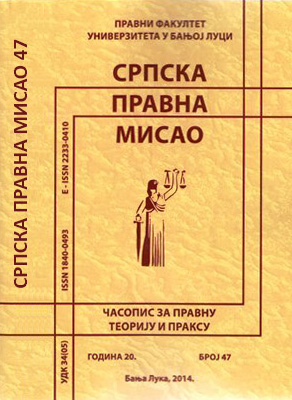

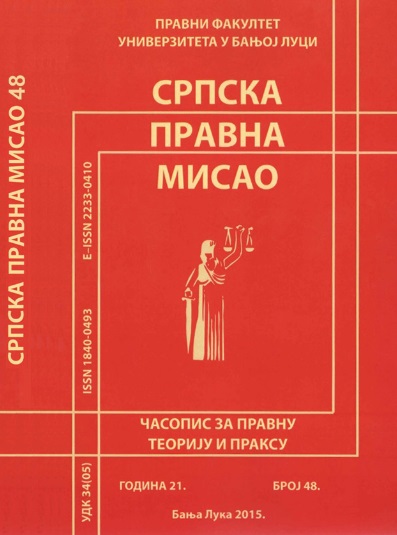


Review of: Др Снежана Бркић, КРИВИЧНО ПРОЦЕСНО ПРАВО II, треће измењено издање (Правни факултет Универзитета у Новом Саду, Нови Сад, 2013, стр. 348.)
More...
Review of: Др Зоран Васиљевић, ПРАВНА ТЕОРИЈА КРЕДИТА (Правни факултет Универзитета у Бањој Луци, Бања Лука 2013. стр. 375, 25 цм )
More...
The author deals with the relationship between the continued criminal offense and some institutes of substantive and procedural law. The choice of these institutes and bringing them in connection with the institute of continued criminal offense is made on the basis of analysis of interconnections between the application of the institute of continued criminal offense and the latter institutes. Therefore, the author examines the relationship between the continued criminal offense and time validity of the criminal law, then the application of the principle of ne bis in idem in the case of a continued criminal offense, as well as the relationship between the continued criminal offense and institutes of statutes of limitation and amnesty. The author points out that it is the relationship between continued criminal offense and these institutes that reflects all the complexity of its application in practice, while the new legal solution for this institute in the Republic of Srpska aims to overcome these problems, but some dilemmas related to its application have not been fully resolved.
More...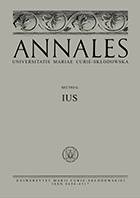
On the territory of the Republic of Poland, there are currently 14 companies managing special economic zones, subordinated to the minister responsible for economy. Each of them operates in a specific area of Poland. Pursuant to the Act of 10 May 2018 on supporting new investments, each special economic zone appoints an economic area development council. It performs a consultative and advisory function and is composed of representatives of entrepreneurs, local government units located within the area managed by the zone, and representatives of voivodship councils for social dialogue. The aim of the article is to discuss the functioning of economic area development councils in the legal and practical aspects and to attempt to formulate proposals for necessary changes in this area. This task is carried out through the analysis of the current activity of economic area development councils based on information obtained from entities managing special economic zones as part of access to public information.
More...
The article illustrates the relationship between the perception of the law and its practical application. For this purpose, a case was used in which controversies arose concerning the application of the Act on shaping the agricultural system. Those controversies boiled down to the question of whether the regulations contained in this Act and concerning the acquisi- tion of agricultural real estate should also apply in the case of the transformation of a limited liability company into a limited partnership. The deliberations performed showed that the legal assessment of the same issue may differ depending on whether the person making the assessment adheres to a positivist or natural law perception. The former tends to lead the interpreter to rely mainly on a literal interpretation, while the latter tends to rely on other methods of interpretation, including a functional-objective interpretation. The latter even implies the need to verify positive law and to concretise legal norms in atypical cases. Such an approach allows to avoid legal assessments that lead to consequences that are, on the one hand, in line with the literal reading of the rules and, on the other hand, irrational and therefore unjust and wrong.
More...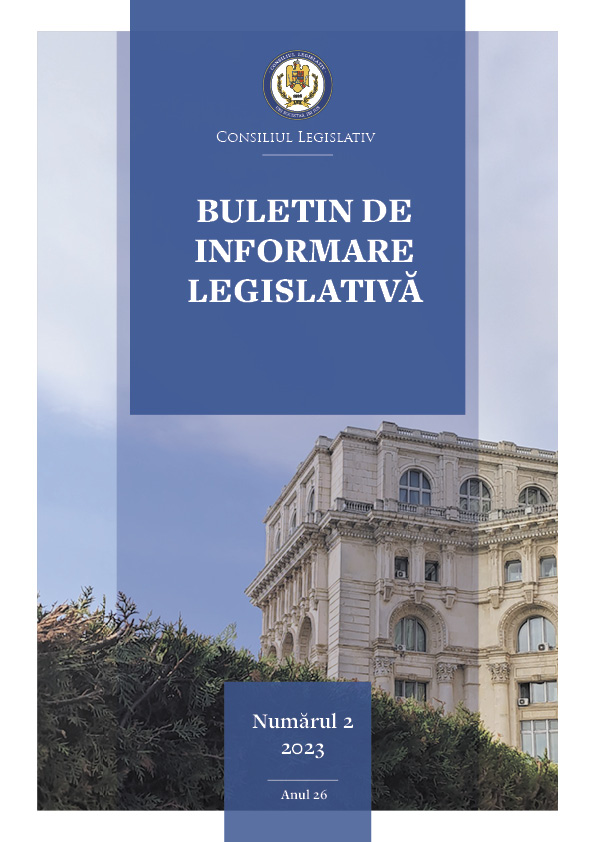
The rest leave granted to employees undergoing an „in vitro” fertilisation procedure was introduced by Emergency Ordinance No 26/2019 amending and supplementing certain legislative acts published in the Official Gazette, Part I, No 309 of 19 April 2019. Although it represents a right and its regulation is found in Law no. 53/2003 - Labour Code republished, with subsequent amendments and additions, the practical situations that an employer and his employee undergoing a fertilization procedure may face, do not find legislative solutions in the reference normative texts.
More...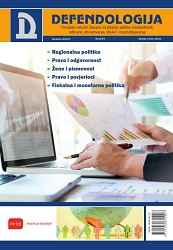
The question of responsibility in general, and in particular forms of legal responsibility was, is and will be an actual problem of any social system. The social system is as stable and progressive as the principles and norms of responsible behavior are respected and implemented. Responsible behavior cannot be achieved by declarations and proclamations of norms, but rather, represents a permanent activity on the effectuation of legal norms by the administrative authority in the environment of a stable and progressive policy determined by the executive authority. In this way, responsible action is advocated and favored, as well as awareness of the inevitability of responsible work. Otherwise, sanctions will follow, which are the consequences of not complying with legal norms. The paper analyzes the legal and political responsibility of personnel in the narrower and broader sense, as well as all other forms of legal responsibility of politicians (criminal, civil, misdemeanor, and disciplinary). The legal and political responsibility of politicians is a consequence of the violation of the legal norm/s. Those legal norms explicitly instruct politicians to perform their duties in a certain way and according to a certain procedure. Hence the determination to objectively analyze the forms of legal responsibility of politicians and officials of the executive and administrative authorities in Bosnia and Herzegovina through a descriptive method. The results of the analysis indicate that the political responsibility of officials in our country is de facto extralegal, and therefore not regulated by legal norms. This practically means that the political responsibility of officials in Bosnia and Herzegovina is completely outside the sphere of law, which is nonsense.
More...
Pitanje odgovornosti općenito, a posebno oblika pravne odgvornosti, bilo je, jeste i biće aktuelan problem bilo kog društvenog sistema. Društveni sistem je zapravo onoliko stabilan i progresivan, koliko se poštuju i ostvaruju principi i norme odgovornog ponašanja. Odgovorno ponašanje se ne može postići dekleracijama i proklamiranjem normi, već to predstavlja permanentnu aktivnost na efektuiranju pravnih normi od strane upravne vlasti u ambijentu stabilne i progresivne politike koju utvrđuje izvršna vlast. Na ovaj način se zagovara i favorizira odgovorno djelovanje, te svijest o neminovnosti odgovornog rada. U protivnom, slijede sankcije koje su posljedice nepoštivanja pravnih normi. Rad analizira pravno političku odgovornost kadrova u užem i širem smislu, kao i sve druge oblike pravne odgovornosti političkih funkcionera (krivičnu, građansku, prekršajnu i disciplinsku). Pravna politička odgovornost političkih funkcionera je posljedica povrede pravne norme/i. Te pravne norme političkim funkcionerima eksplicitno nalažu izvršavanje njihovih poslova na određeni način i po određenom postupku. Otud i opredjeljenje da na objektivnoj ravni, putem deskriptivne metode analiziramo oblike pravne odgovornosti političkih funkcionera i službenika izvršne i upravne vlasti u Bosni i Hercegovini. Rezultati analize ukazuju da je politička odgovornost funkcionera u našoj zemlji de facto vanpravna, pa zbog toga i nije regulisana pravnim normama. To praktično znači da je politička odgovornost funkcionera u Bosni i Hercegovini u potpunosti izvan sfere prava, što je nonsens.
More...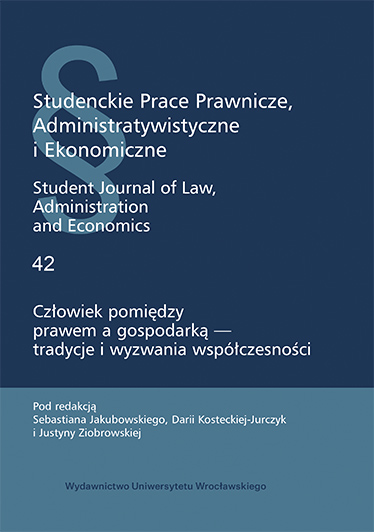
The president has a peculiar, somewhat unclear function in the Polish legal system. Despite being elected by common vote, which should give him significant authority, the Polish president does not hold important prerogatives. The main goal of the article is the analysis of different head of the state models, best exemplified by the Federal Republic of Germany and the Republic of Italy, and a major aspect of the presidency — the significance vested in the fact of being elected. The analysis leads the author to postulate introducing gradual changes in regulations pertaining to the office of president in the Polish Constitution modelled on of the German Basic Law and Constitution of Italy.
More...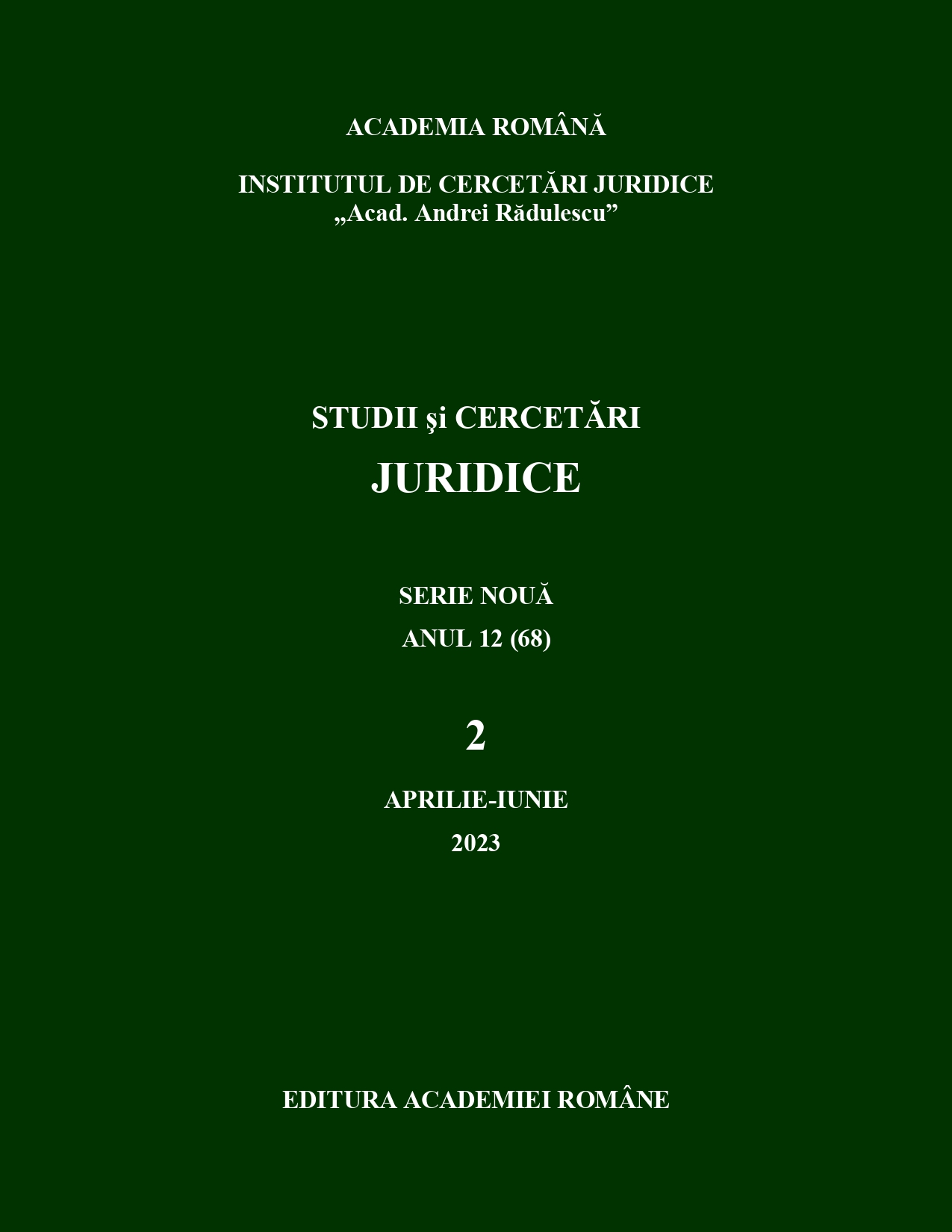
Pe data de 20 aprilie 2023 au avut loc la sediul Institutului de Cercetări Juridice „Acad. Andrei Rădulescu” („ICJ”) al Academiei Române – Casa Academiei Române din București, sesiunea anuală de comunicări științifice.
More...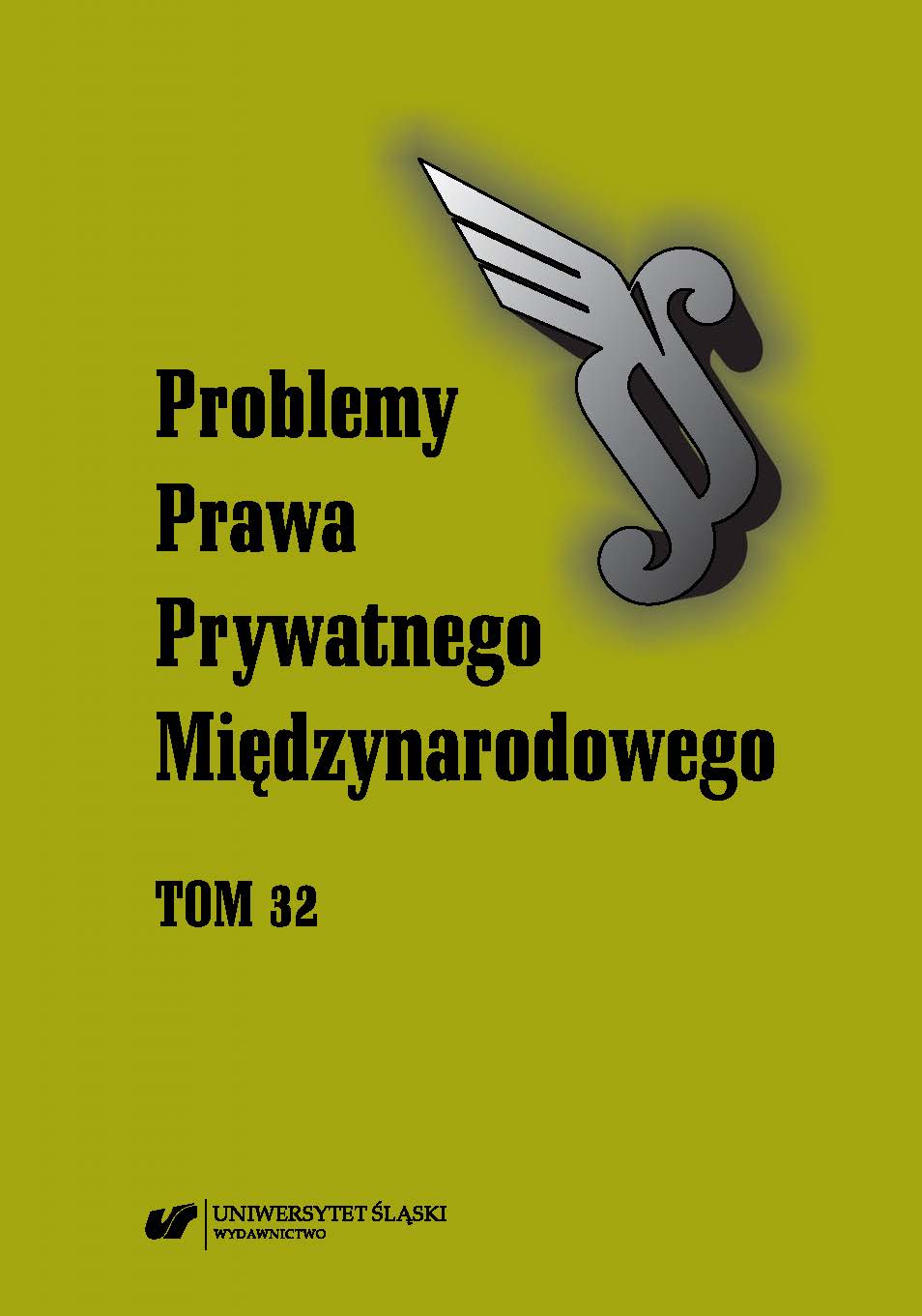
The author aims to present the possibilities of helping Ukrainian citizens from the practical side, as based on author’s own professional experience. To that effect, the paper considers various legal issues faced daily by Ukrainians who came to Poland after the outbreak of the war in Ukraine. The purpose of the article is also to study the changes in Polish legislation that were introduced to simplify the possibility of regulating the legal situation of Ukrainian citizens residing in Poland. The work touches upon the issue of legalizing the stay of Ukrainians on the territory of the Republic of Poland, the care and guardianship of minor children coming from Ukraine, the transfer of economic activity from Ukraine to Poland, as well as the issue of marriage conclusion by Ukrainians in Poland.
More...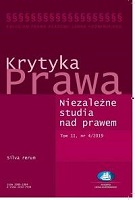
The present article discusses the problem of the enterprise in the inheritance as a subject of the specific bequest. Its aim was to defend the thesis according to which it is legally permissible to make the enterprise in the inheritance or the share in the enterprise in the inheritance the subject of the specific bequest. The article uses the logical-linguistic method and also the argumentative method (legal topic). The analysis conducted in the article shows that the subject of the specific bequest can be the enterprise in the inheritance or the share in the enterprise in the inheritance, for which an extensive argumentation has been presented.
More...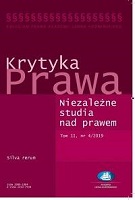
The article of a review character undertakes a polemic with the authors of the book edited by M. Nowak entitled The Role of the Law in the Spatial Management System on spatial planning and development presented from the perspective of the law. The authors undertook to present the role of law in the spatial management system, but they did so taking into account the fact that in spatial planning, apart from lawyers, there are also such participants as urban planners, city and landscape architects, officials and the public. In the book there are not only material legal accents embedded in the themes of environment, cultural landscape and monuments, but also procedural threads. There are issues of a general nature, concerning the role and interpretation of the law, interdisciplinary issues, reaching into other sciences (economics, urban planning), specific issues (fee) and issues of a changing and dynamic nature (COVID-19 and spatial policy). The work strongly emphasises the axiological dimension with references to phrases such as public interest or common good. In good conscience, I recommend reading the book to all those interested in ‘planning law’ in the broadest sense of the term, and to those who prefer the intersection of legal and non-legal sciences. The book will also appeal to the academic community and the legal profession.
More...